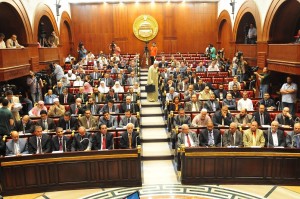Over three decades after Spain withdrew from the Western Sahara, the fate of the region is back on the negotiating table. However, Sahrawis longing for a free and independent homeland fear that it is their dream that will be served up on the United Nations-sponsored menu, fit to be gobbled up as an appetizer for broader deals concerning political unity in the Maghreb and international cooperation against Islamist terrorism.
Although representatives of the disputed territory were present at UN-organized talks in New York last month – the pro-independence Polisario Front members left Manhasset with the same attitude with which they had arrived: “The land has never been Moroccan, is not Moroccan and never will be. The atmosphere is somewhat similar to the so-called Madrid Accords of 1975, when Spain signed its colony away to be carved up by Morocco and Mauritania (which later renounced its claim), without a Sahrawi voice to be heard.
Things have changed under United Nations Secretary-General Ban Ki-moon, taking over where Kofi Annan left off, and the latest UN special envoy to the territory, Peter van Walsum. The emphasis has shifted from patient insistence on the UN-agreed framework for a referendum on independence to a desire to find a “mutually acceptable solution. When Morocco, which had stonewalled on the Baker Plan since its unanimous adoption by the Security Council in 2004, finally presented its proposals for limited autonomy for Western Sahara in April of this year, the UN enthusiastically welcomed the idea, hastening to arrange the talks.
The reason for the shift is twofold: on the one hand, there is clearly institutional impatience regarding an impasse that has remained unshakeable since the UN-brokered ceasefire in 1991. Influenced by both Paris and Madrid, where Socialist Prime Minister Jose Luis Rodriquez Zapatero took power in 2004 promising to achieve a breakthrough in the Western Sahara crisis within six months, Annan increasingly urged the involved parties – including Algeria, which supports Polisario – to seek a negotiated settlement beyond the terms of the UN framework meant to lead up to a referendum.
The other circumstance weighing heavily against the Polisario is that history has simply moved on. During the years of the armed conflict, it benefited from military equipment via a Cold War axis of the Soviet Union and Algeria, still the host country to tens of thousands of Sahrawi refugees. Last year, Vladimir Putin became the first Russian head of state to visit Morocco, and negotiations for a Russian-built nuclear power plant in the kingdom are underway.
As for the United States, the Polisario does have friends in Congress, but Morocco is the star pupil of President George W. Bush’s Greater Middle East democracy initiative, and has been awarded both a free-trade accord and special ally status.
In Europe, France has always been an unwavering – and far from disinterested – ally of Morocco, and Spain has performed an abrupt U-turn under Zapatero and his foreign minister, Miguel Angel Moratinos. To refer to any possible deal, the pair has consistently stated that it should be “within the framework of the United Nations, to the extent that the phrase has come to sound like a code for the dropping of the Polisario’s historical claim to self-determination.
The sense of betrayal is palpable amongst Sahrawi leaders, accustomed to the support of Spain’s left wing, leading to their insistence that Spanish diplomats not be present around the table in Manhasset. Mahfoud Ali Beiba, who headed the Polisario’s negotiating team in New York last month, told an Algerian newspaper that “Madrid’s presence was unnecessary, and that it could “stand in the way of our talks.
This rebuke may have stung the Spanish Foreign Ministry, but it will also have confirmed its belief that the medicine of a realistic approach “within the framework of the United Nations was taking effect. Very much on the front line of the fundamentalists’ jihad, Madrid has taken the lead in voicing a key Western concern: that the poisoned relationship between Algeria and Morocco, which has caused the Arab Maghreb Union to be stillborn since its inception in 1989, has led to a dangerous void in security cooperation in Europe’s Arab and Islamic backyard.
Key to this question and ultimately the fate of the Sahara talks, set to continue in August, is Algeria. Algiers has thus far refused to act as final arbiter, shielding itself behind the fact that it is not officially a party to what is still defined by the UN as a decolonization dispute. Just what role Algeria, currently enjoying a gas-driven boom that leaves it relatively independent in economic terms, will play is still the great mystery of the process.
On June 29, Ban Ki-moon posted a report on the UN Web site about the initial round of talks, in which he urged the Polisario to “temporarily set to one side its claim of self-determination in order to “test the extent of the Moroccan autonomy initiative. After howls of protest from the Sahrawis and their backers in Algeria and South Africa, the report was hastily removed. Morocco has said it is prepared to be “generous when drawing up the economic aspect of a future division of power with a semi-autonomous Western Sahara.
With a return to war seemingly out of the question, perhaps the Polisario leaders must now see the fight for a lion’s share of the region’s huge phosphate and potentially interesting oil reserves as the only remaining battleground upon which to salvage their honor.
James Badcockis freelance writer based in Spain who specializes in North African and Middle Eastern affairs. He wrote this commentary for THE DAILY STAR


